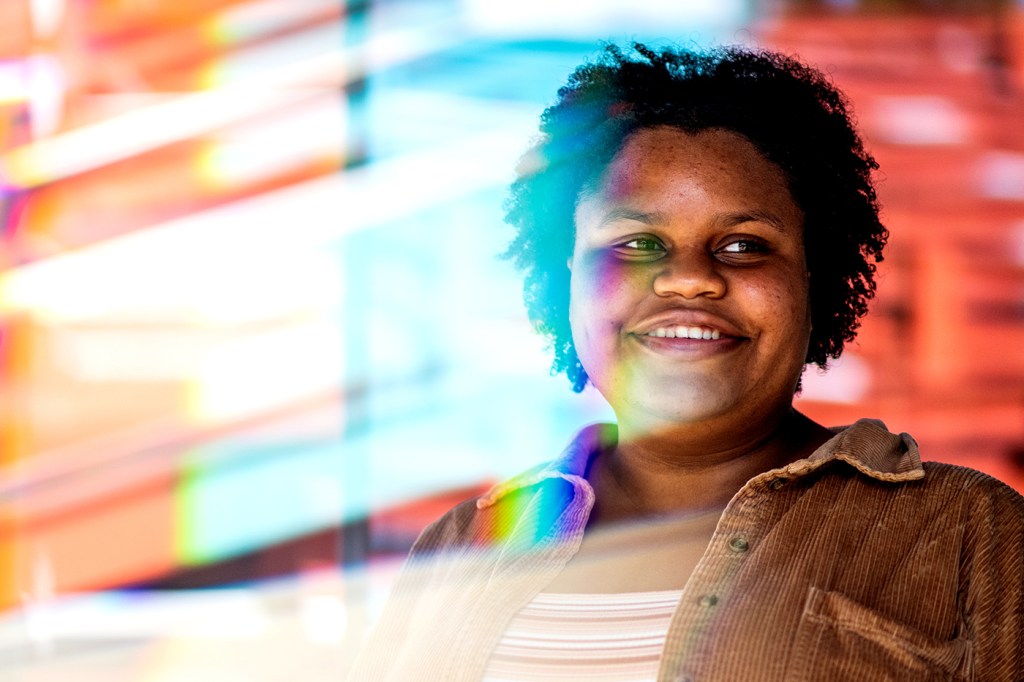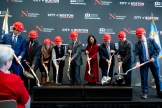You’re with Us! disability mentoring program expands inclusivity

Aliyah Jackson, a second-year psychology major, instantly loved the mission of her co-op at a Boston nonprofit organization called You’re with Us!—which expands access and inclusion in everyday activities for young adults with disabilities. The work also opened her eyes to the difficulty that young adults with disabilities face after they turn 22 years old and age out of most of their federal and state support services.
The disability mentoring program pairs young adults with mentors who work to improve their independence, ensuring they can access whatever is needed to get a job, get groceries, join a club, or to enjoy any other aspect of their lives.
Jackson says the co-op has also taught her key workplace lessons, such as the differences between working at a nonprofit organization versus a private company and the rewards and challenges of working with marginalized populations. Even her interview experience helped broaden her understanding of the kind of workplace in which she’d like to end up when she graduates and the kind of people she hopes to work with. She spoke about the co-op during a wide-ranging interview with News@Northeastern that’s been lightly edited for clarity.
Why did you choose to work at this co-op?
The goal of the organization is just really necessary. It’s so important to include people with disabilities and integrate them into social groups because I feel like there’s a lot of exclusion out there, especially in the college demographic.
Were there any other reasons?
I also had an interest in working for a nonprofit because I wanted to see what type of work that they’re doing and how they run their organizations. I think that may be the type of work environment that I’m interested in working for in the future.
What’s different about working for a nonprofit?
I think definitely what sticks out as different to me is how much is really going on. Sometimes in a for-profit job, it feels like everything is all structured and lined up. Everything fits very squarely to the job posting. For a nonprofit I feel like there’s just so much going on behind the scenes and there’s so many moving parts that you get to watch happening. Here I get to see a lot of the strategic planning for the organization, and I get a lot of hands-on experience working with people with disabilities and their service coordinators.
What was the hiring process like?
What definitely sealed the deal for me personally was the interview. It’s probably the most comfortable interview I’ve ever had. I was nervous, obviously, but the environment of all of the supervisors and the team who worked there was fabulous. I essentially interviewed with every single person who I sit with in a staff meeting every week, and they made me feel so comfortable. I felt like they cared about me and my goals and what I wanted to do.
What have you learned from the co-op so far?
This co-op has really helped me learn how to be flexible in my communication style and helped me to be persistent when reaching out to people because some of the mentees that I mentor have different communication styles. Sometimes I worry I’m just talking at them instead of with them. Even though they’re listening, they’re just not participating in the conversation the way I’m used to. I learned that they’ll participate further down the line if they want to or even much later when they feel like they have something to contribute.
Can you tell us a little about your day-to-day work?
A large part of my job is just trying to get in contact with parents so that I can set up meeting times with their kids. Sometimes it’s just a lot of texting and calling and emailing to find a time that really works for us all to sit down and get their kid back in the program. Parents are busy and sometimes things just fall through the cracks, but they really appreciate it when you’re going out of your way to communicate with them and try to find something that works for them and their disabled child.
Is there anything you have difficulty doing at this job?
Something that I’m still navigating is how freeform the co-op is. No one is sitting me down and telling me exactly what I need to be doing every second of the day, so I have been making my own schedule and deciding things that I need to do on my own that I feel will contribute to the organization. I definitely think I was expecting more structure coming in, but it’s been really loose and kind of freeform so far. Now that we’re getting back into the school year I think it will pick up again and my schedule will look more solid.
Were you surprised by anything about the job?
I really like how perspective-changing this co-op has been because I think a lot of times people just don’t think about the experience of someone with a disability.
This co-op does a great job of showing you what people with disabilities typically experience when they’re transitioning out of the school program. It also shows you their own individual, everyday struggles and their strengths and how they’re managing their own disability.
What advice would you give to a student considering this co-op?
You need to come in with a positive attitude. Just take things as they go and reach out for help when needed. I focus on doing as much as I can in the capacity that I can, I think that’s really a helpful positive mindset to keep you going. Another thing I would say is, if possible, keep in contact with the students who had the co-op before you. There are two previous co-ops who still work here, and they’ve been a wealth of resources in terms of what to do and how to do it.
For media inquiries, please contact media@northeastern.edu.





